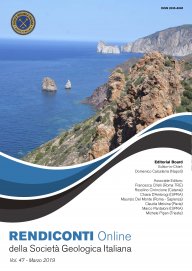
Groundwater level forecasting using linear time series modeling: the case study of the thermal aquifer system of Monsummano Terme (central Italy)
Chiara Zanotti (1), Tullia Bonomi (1), Marco S. Nannucci (2) & Marco Rotiroti (1)
(1) Department of Earth and Environmental Sciences, University of Milano-Bicocca, Milan, Italy.
(2) Regione Toscana, Direzione Ambiente ed Energia, Firenze, Italy.
Corresponding author e-mail: c.zanotti@campus.unimib.it
Volume: 47/2019
Pages: 153-160
Abstract
Groundwater level forecasting can support a more efficient and sustainable groundwater management. In the present study, linear models are implemented on hydrogeological and meteorological time series related to the thermal aquifer system of Monsummano Terme (Pistoia province, Tuscany region in central Italy), in order to develop a tool for short-term groundwater level forecasting.
Groundwater level data were analyzed along with daily precipitation and used for training Autoregressive (AR) models and Autoregressive models with Exogeous Input (ARx). The best performing AR model consisted in a linear combination of the
past 9 groundwater level measurements whereas the ARx model concerned, in addition, the precipitation values of the past 10 days. As a result, these models show an optimal performance in terms of Normalized Root Mean Square, and their residuals (i.e. modeled – measured values) can be associated to a white noise containing no relevant information. This study shows how linear models can be
useful and easy-applicable tools for groundwater level forecasting in systems characterized by a linear relationship between recharge and groundwater level increase.
Keywords
Get Full Text